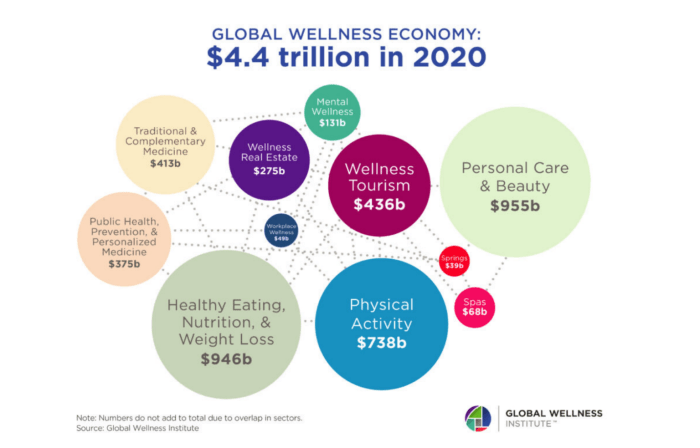Embark on a journey through the landscape of wellness-based insurance programs in 2025, where innovation meets healthcare in a harmonious blend. Discover the latest trends, key players, and impactful strategies shaping the future of insurance coverage.
Overview of Wellness-Based Insurance Programs

Wellness-based insurance programs are a proactive approach to healthcare that focuses on prevention rather than just treatment. These programs incentivize policyholders to lead healthier lifestyles by offering rewards or discounts for meeting wellness goals. By integrating wellness into insurance coverage, these programs aim to reduce healthcare costs in the long run and improve overall well-being.Over the years, wellness-based insurance programs have evolved to encompass a wide range of health and wellness initiatives.
From fitness tracking devices to personalized wellness plans, these programs have become more tailored to individual needs. The use of data analytics and technology has also played a significant role in enhancing the effectiveness of these programs.
Key Features of Wellness-Based Insurance Programs
- Personalized Wellness Plans: Insurance companies offer customized wellness plans based on individual health needs and goals.
- Incentives for Healthy Behavior: Policyholders are rewarded for engaging in healthy activities such as regular exercise, nutritious eating, and preventive screenings.
- Data-Driven Insights: Utilization of data analytics to track progress, identify health risks, and make informed decisions.
- Health Coaching and Support: Access to health coaches or wellness professionals to provide guidance and support in achieving wellness goals.
- Integration with Digital Health Tools: Integration with wearable devices and health apps to monitor health metrics and encourage positive lifestyle changes.
Benefits of Integrating Wellness into Insurance Coverage
- Cost Savings: By focusing on prevention and early intervention, wellness-based programs can help reduce healthcare costs in the long term.
- Improved Health Outcomes: Encouraging healthy behaviors can lead to better health outcomes, reduced risk of chronic diseases, and improved quality of life.
- Enhanced Member Engagement: Offering incentives and personalized support can increase member engagement and motivation to take charge of their health.
- Long-Term Sustainability: Promoting wellness can create a culture of health that is sustainable and benefits both individuals and the healthcare system as a whole.
Trends and Innovations in Wellness-Based Insurance Programs

Wellness-based insurance programs have been evolving rapidly to meet the changing needs of consumers and the advancements in technology. These programs focus on preventive care, promoting healthy lifestyles, and incentivizing individuals to take proactive steps towards their well-being.
Integration of Wearable Technology
The integration of wearable technology such as fitness trackers and smartwatches has become a prominent trend in wellness-based insurance programs. These devices allow insurers to track individuals' activity levels, heart rate, sleep patterns, and more, providing valuable data for personalized health assessments and incentives.
Telehealth Services
Telehealth services have become increasingly popular, especially in light of the COVID-19 pandemic. Wellness-based insurance programs are now offering virtual consultations with healthcare providers, making it easier for individuals to access care from the comfort of their homes. This trend not only promotes convenience but also ensures continuity of care.
Incentivizing Healthy Behaviors
Many wellness-based insurance programs are incorporating incentives to encourage healthy behaviors. This can include rewards for meeting fitness goals, participating in wellness challenges, or completing preventive screenings. By incentivizing these activities, insurers are promoting a proactive approach to health and wellness.
Data Analytics and Personalized Insights
Advancements in data analytics have enabled insurers to provide personalized insights to individuals based on their health data. By analyzing trends and patterns, insurers can offer tailored recommendations for improving health outcomes. This data-driven approach is shaping the future of wellness-based insurance programs.
Key Players and Partnerships in the Wellness Insurance Industry
In the landscape of wellness insurance, several major insurance companies have emerged as key players, offering innovative wellness-based programs to their policyholders. These companies have also formed successful partnerships with wellness providers to enhance the effectiveness of their programs and promote better health outcomes for their customers.
Major Insurance Companies Offering Wellness-Based Programs
- UnitedHealth Group: UnitedHealth Group is a leading provider of wellness insurance programs, offering a wide range of services aimed at promoting preventive care and overall health and well-being.
- Anthem Inc.: Anthem Inc. is another major player in the wellness insurance industry, known for its comprehensive wellness initiatives and personalized health management programs.
- Cigna Corporation: Cigna Corporation has also made significant strides in the wellness insurance space, focusing on holistic health solutions and preventive care measures.
Successful Partnerships Between Insurers and Wellness Providers
- Blue Cross Blue Shield and Fitbit: Blue Cross Blue Shield has partnered with Fitbit to offer personalized wellness programs to their policyholders, leveraging wearable technology to track and improve health outcomes.
- Aetna and CVS Health: Aetna's partnership with CVS Health has resulted in the development of innovative wellness clinics within CVS stores, providing convenient access to preventive care services for policyholders.
Role of Employers in Promoting Wellness Insurance Among Employees
Employers play a crucial role in promoting wellness insurance among their employees by offering comprehensive health benefits packages, incentivizing participation in wellness programs, and creating a culture of health and well-being in the workplace. By investing in the health and wellness of their workforce, employers can reduce healthcare costs, improve employee productivity, and enhance overall job satisfaction.
Influence of Government Policies on the Growth of Wellness Insurance
Government policies and regulations can have a significant impact on the growth of wellness insurance by incentivizing insurers to offer preventive care services, promoting partnerships between insurers and wellness providers, and expanding access to wellness programs for underserved populations. By aligning government initiatives with private sector efforts, the wellness insurance industry can continue to evolve and thrive in the years to come.
Customer Experience and Engagement Strategies
Customer engagement is crucial in wellness-based insurance programs to ensure active participation and long-term success. By implementing personalized wellness plans, incentives, and effective engagement strategies, insurance companies can motivate customers to prioritize their health and well-being.
Personalized Wellness Plans
One key strategy to enhance customer engagement is to offer personalized wellness plans tailored to individual needs. By utilizing data analytics and customer input, insurance companies can create customized programs that address specific health goals and challenges. These plans can include personalized fitness routines, nutrition recommendations, mental health resources, and more.
Use of Incentives
Incentives play a significant role in encouraging participation in wellness activities. Insurance companies can offer rewards such as discounts on premiums, gift cards, or other perks for completing health assessments, achieving fitness milestones, or participating in wellness challenges. These incentives not only motivate customers to engage in healthy behaviors but also foster a sense of accomplishment and progress.
Successful Customer Engagement Initiatives
Several insurance companies have implemented successful customer engagement initiatives in the wellness insurance sector. For example, some companies have developed mobile apps that track fitness progress, provide personalized health tips, and offer virtual coaching sessions. Others have partnered with fitness centers, nutritionists, and wellness experts to provide additional resources and support to customers.
The Impact of Wellness Programs on Health Outcomes and Costs
Wellness programs have shown significant potential in improving health outcomes and reducing healthcare costs for both insurers and policyholders. By focusing on preventive care and promoting healthy lifestyle choices, these programs aim to address health issues before they escalate, ultimately leading to cost savings and improved well-being.
Improved Health Outcomes
- Wellness programs have been linked to lower rates of chronic diseases such as diabetes, heart disease, and obesity.
- Regular participation in wellness activities like exercise, healthy eating, and stress management has been shown to enhance overall health and well-being.
- Employees who engage in wellness programs tend to have higher productivity levels and lower absenteeism rates due to improved health.
Reduced Healthcare Costs
- Preventive care measures, encouraged through wellness programs, can help detect health issues early on, reducing the need for costly treatments later.
- By investing in wellness, insurers can lower medical expenses related to chronic conditions and hospitalizations, leading to long-term cost savings.
- Case studies have demonstrated that wellness programs can result in a significant reduction in healthcare expenses for both individuals and insurance providers.
Closure
As we wrap up our exploration of Top Wellness-Based Insurance Programs in 2025, it becomes evident that the intersection of wellness and insurance is paving the way for a healthier and more informed future. Stay tuned for more updates on this evolving industry.
FAQ Corner
What are the key features of wellness-based insurance programs?
Wellness-based insurance programs typically focus on preventive care, personalized wellness plans, and incentives for participating in wellness activities.
How do wellness programs impact health outcomes and costs?
These programs have been shown to improve health outcomes, reduce healthcare costs through preventive care, and offer long-term benefits for insurers and policyholders.
Which major insurance companies offer wellness-based programs?
Some of the key players in the wellness insurance industry include major insurance companies like Aetna, UnitedHealthcare, and Cigna.












